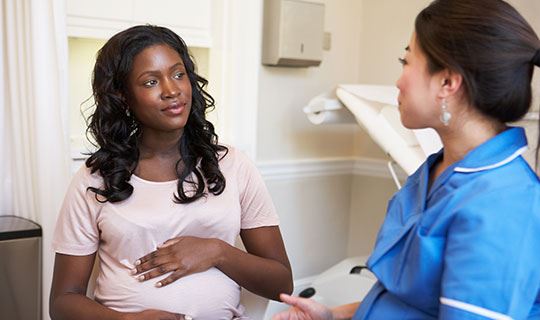Maternal-Fetal Medicine
What Is a High-Risk Pregnancy?

Some women are at higher risk of complications during pregnancy than others. Your pregnancy may be considered high risk if you:
- Are pregnant with multiple babies (twins or triplets, for example)
- Are a teenager
- Were older than 35 when your baby was conceived
- Have a history of pregnancy complications
- Have a medical condition such as heart disease, high blood pressure, diabetes, obesity, substance use disorder, sexually transmitted disease, autoimmune disorder
- Are pregnant with a baby that has been diagnosed as having a birth defect
- Have a family history of genetic disease
If your pregnancy is determined to be high risk, your doctor will need to monitor you closely to ensure the health and safety of you and your baby.
RWJBarnabas Health’s obstetricians, gynecologists and maternal-fetal medicine specialists (perinatologists) can advise you on care plans and strategies that can offer the best chance for a healthy pregnancy and delivery.
Multiples
If you are over the age of 30, taking fertility drugs or had in vitro fertilization, the chances of carrying multiple babies is higher. A routine ultrasound in the first trimester will determine if you are carrying more than one child.
Premature labor (before 37 weeks of pregnancy), preeclampsia, gestational diabetes and growth issues, as well as increased need to have a caesarian section, are complications of multiple births. Twins and triplets are more likely to be smaller for their size than single birth infants and are likely to have difficulty breathing.
If you are pregnant with multiple babies, your doctor will carefully monitor your progress and your babies' development throughout your pregnancy to provide the best possible outcome.
Pregnancy and Heart Disease
During pregnancy, a woman’s heart works extra hard, pumping blood for two instead of one. Her body’s blood volume increases between 30 and 50 percent, heart rate may rise, and blood pressure may fall. This can put additional stress on the heart.
Preexisting conditions like congenital heart defects could also make women more vulnerable to complications during pregnancy. For example, women with heart defects may have a higher risk for anemia, hemorrhage, or high blood pressure. They will need careful monitoring throughout the pregnancy.
If you have a heart condition, talk with your doctor about special precautions and monitoring you may need.
Read more about pregnancy and heart disease.
Pregnancy and Hypertension
Hypertension (high blood pressure) can lead to serious health complications for both the mother and baby.
The two main types of hypertension are:
-
Chronic hypertension High blood pressure that was present before a woman becomes pregnant or that occurs in the first half (before 20 weeks) of pregnancy.
-
Gestational hypertension. High blood pressure that first occurs in the second half (after 20 weeks) of pregnancy. Although gestational hypertension usually goes away after childbirth, it may increase the risk of developing hypertension in the future.
The effects of high blood pressure range from mild to severe and may include:
- Fetal growth restriction. High blood pressure can decrease the flow of nutrients to the baby through the placenta.
- Preeclampsia. In severe cases, women develop preeclampsia, which is increased blood pressure that affects organ function. This condition is more likely to occur in women with chronic high blood pressure than in women with normal blood pressure.
- Preterm delivery. If the placenta is not providing enough nutrients and oxygen to your baby, it may be decided that early delivery is better for your baby than allowing the pregnancy to continue.
- Placental abruption. This condition, in which the placenta prematurely detaches from the wall of the uterus, is a medical emergency that requires immediate treatment.
- Cesarean delivery. Women with hypertension are more likely to have a cesarean delivery than women with normal blood pressure.
Pregnancy and Obesity
Obesity may contribute to a higher risk of complications during pregnancy. Women who are obese may be at greater risk for preeclampsia and gestational diabetes. The chances of a stillbirth or need for caesarean delivery are higher. Obesity is associated with increased use of health care service and longer hospital stays for delivery.
Learn more about weight gain and weight loss during pregnancy from the Centers for Disease Control and Prevention.
Gestational Diabetes
Gestational diabetes, or diabetes during pregnancy, is diabetes that first develops when a woman is pregnant. All pregnant women are screened for gestational diabetes – usually between 24 and 28 weeks of pregnancy and earlier for women with risk factors. Those most at risk for gestational diabetes are women who:
- Have a family history of diabetes
- Had a baby who weighed more than nine pounds
- Had a miscarriage
- Are older than 25
- Have had a stillbirth in a previous pregnancy
- Are African American, American Indian, Asian American, Hispanic, Latina or Pacific Islander
- Are overweight
Uncontrolled gestational diabetes increases the risk for preterm labor and delivery, preeclampsia, and high blood pressure.
Many women with gestational diabetes can have healthy pregnancies if they manage their condition, following a diet and treatment plan from their health care provider.
Superior Care for High-Risk Pregnancies at RWJBarnabas Health
Choosing a doctor is one of the most important decisions you can make to ensure that your high-risk pregnancy is managed optimally for the best possible outcome. Consider the hospital where you would like to deliver your baby. Is it equipped with a top-notch neonatal intensive care unit (NICU)? What is the ratio of nurses to patients?
RWJBarnabas Health maternity centers have state-of-the-art technology and expert medical staff. We are equipped to handle any emergency for mothers and babies before, during and after delivery. Learn more about maternity care at RWJBarnabas Health.
Find a doctor today or request a maternity tour at an RWJBarnabas Health hospital.



